April 2015
Crowdfunding Crash Course: Mike Raven - The Travelling Book
- by Alyson Shane
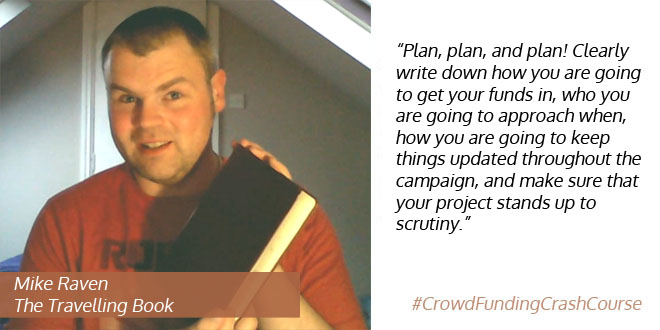
Mike Raven is a blogger and video maker from Hull, UK. He used Indiegogo to generate interest and fund his project The Travelling Book.
Can you briefly describe the Travelling Book Project?
The Travelling Book project is a project to help the world connect.
Essentially, the project was to send out a number of “travelling books” (blank journals) that would travel the world from person to person, with each person writing in the journals information about themselves and their lives. When each journal is full it’s supposed to come back to me for me to scan and put on the Internet, so anyone can see where the journal traveled and who it met. This way you could discover what different parts of the world was like actually from the people living there.
I’m still waiting for one of them to make it home!
Why did you feel that the crowdfunding model was the best way to promote the product
When I first had the idea, I decided that I would send five books out. However, when I asked friends and family if they wanted to get involved, straightaway I discovered that there was more demand than there was books available. And I thought to myself that if they wanted to take part, they might be willing to pay.
The great thing about crowdfunding in this case was that the project could scale e.g. people would pay for as many books as they want, and I could put the extra money generated towards a project website which I wouldn’t have been able to create otherwise.
Why and how did you choose Indiegogo over other crowdfunding options available?
To be quite honest, I tried Kickstarter first, and I couldn’t work out how to set it up to work in my country (the UK)! Also, Geek & Sundry had at the time just used Indiegogo to fund the third season of TableTop so it seemed a sensible choice. Indiegogo was the first crowdfunding website and is the second biggest crowdfunding site after Kickstarter so it is well-established.
All that said, Indiegogo does actually have one massive advantage over Kickstarter, and that’s Flexible Funding - the fact that I would receive the funding (minus Indiegogo fees) even if I didn’t reach my target goal was a fantastic benefit for my project, where I didn’t need to reach the target I set.
How big was your budget before you launched your crowdfunding campaign?
Pretty much nothing! I was willing to buy a few blank journals and mail them out to people out of my own pocket, but bearing in mind that each one sent out costs up to £8 - and I don’t really have much spare cash - I was more or less starting with nothing.
How far along was your project before you felt ready to launch a crowdfunding campaign? In hindsight, would you have preferred to be farther along, or to have crowdfunded earlier?
I jumped into crowdfunding far too early on. I basically had the idea for the project, did a quick Facebook post about the project, from that thought that there might be value in doing a crowdfunding campaign, and set it up with a small amount of planning. It was a fine stage of the project to do the crowdfunding, but I should have planned more.
Can you explain how you prepared for and managed your campaign?
I read a lot of blogs about crowdfunding and how to do it. I learned that I needed to get a good amount of income early on in the campaign so I lined up friends and family to donate right at the start so I could show progress, and that worked well.
I had roughly planned how I was going to promote the project and where to, but to be honest I could have done a lot more.
What tools did you use to market your campaign? Do you feel like you did so successfully, and if not, what could you have done differently?
I used various social media channels - my blog, my YouTube channel, Twitter (I use Hootsuite to set up tweets in advance) and Google+ groups, I also did a lot of work promoting the project manually by emailing literally hundreds of writing groups around the world, going on my local radio station, and I also found my old colleges and universities liked to hear about an alumni of theirs doing something that they put could on their blogs (it worked quite well that I ran the campaign in the summer when they probably didn’t have anything better to promote!)
In retrospect what were your best assets for running this successful campaign? On the other hand, what would you do differently?
Friends and family were a great help to me and kept me motivated throughout. However, I should definitely have planned more. For example, as I say I emailed tons and tons of writing groups. However, they generally only meet once every 4-8 weeks, and as my campaign was only a month, sometimes I’d miss their meetings.
Another thing was a lot of my promotional literature was very amateurish - my graphic designs skills are non-existent, and basic things like having a half decent logo, some good pictures and branding were missing.
What was your biggest challenge during your campaign?
I would say keeping motivated, but it did seem like every time I started to get a little downhearted another donation would come in and cheer me up! Finding the right crowd was difficult - I went for writing groups but I’m not entirely sure that I quite got the right people, I do think to this day that if I had marketed the project better I could have got a huge amount of interest.
What’s the most valuable advice you could share with aspiring crowdfunders?
Plan, plan, and plan! Get clearly written down how you are going to get your funds in, who you are going to approach when, how you are going to keep things updated throughout the campaign, and make sure that your project stands up to scrutiny - what exactly are you going to do with the money, when are people going to get the thing you’re promising, and how are you going to deliver?
This post is part of the #CrowdfundingCrashCourse series. You can find the entire series of interviews and summary posts here.
Life, Patios, New Projects, etc!
- by Alyson Shane
Woke up this morning feeling like a million bucks. It's been weird not writing about my day-to-day goings-on so here's a quick summary of what's been up in the non-content marketing parts of my life:
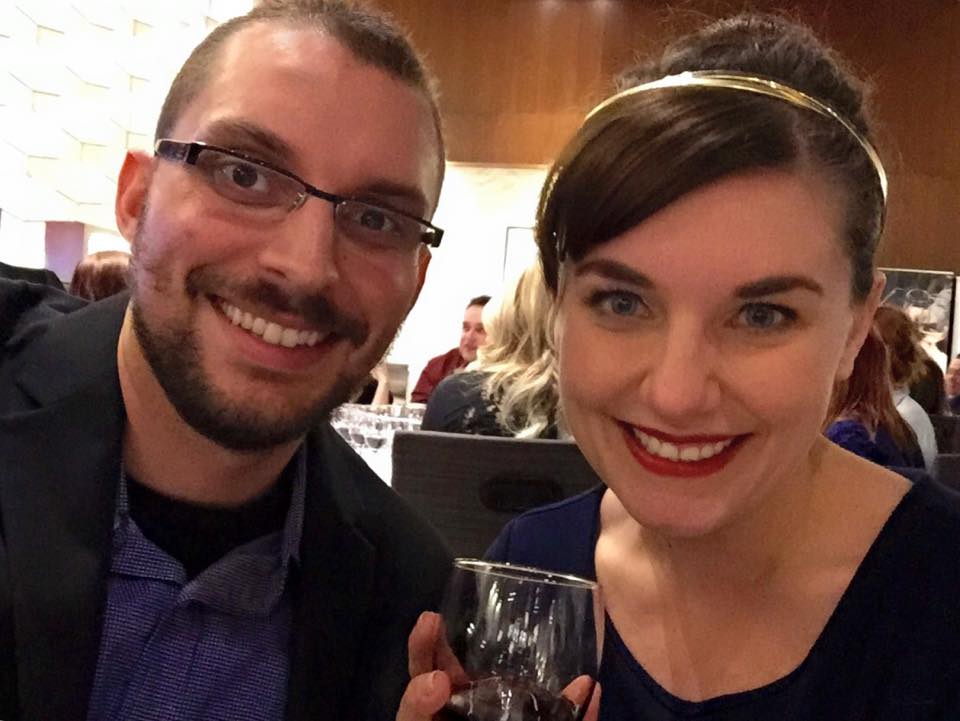
Last Thursday I hauled myself out to the Club Regent Casino in Transcona (when does anyone go there? I'm never in that end of the city!) with ChrisD, Britt, Nesta and a bunch of other local media-types at the Winnipeg Wine Festival Taste Chile Media Dinner.
The food was absolutely incredible and the wines were delicious. This year's Wine Festival features Chilean wines, which are my favourites, so I was all too happy to attend and support Special Olympics Manitoba!
This past weekend was absolutely amazing weather-wise and I dragged John outside basically from dawn till dusk. Sunday we relaxed on the patio at Beachcomber's at The Forks and took our first summertime selfie!
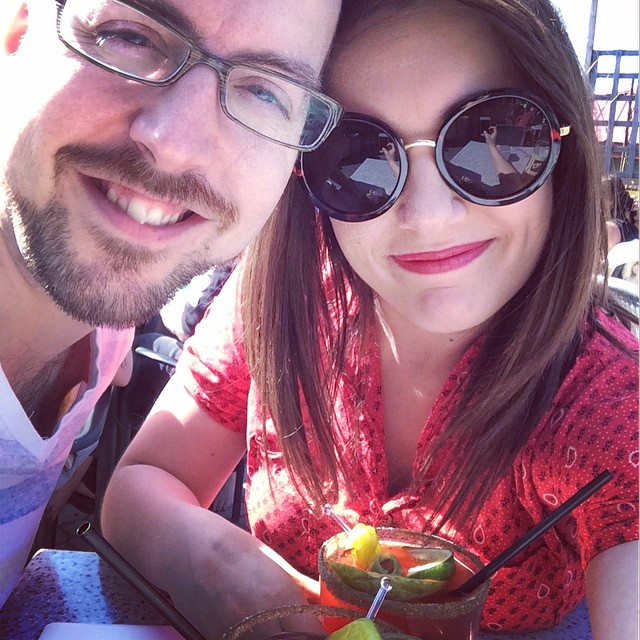
(Expect to see tons of those in my Instagram and Twitter feeds this summer, guys. Sorry/notsorry.)
One of my favourite things about living in Winnipeg is how many people you see outside the moment spring shows up. The weather is so cold in the winter and while hibernating for half the year makes for great creative time, it's so nice to be able to get outside and actually enjoy the city.
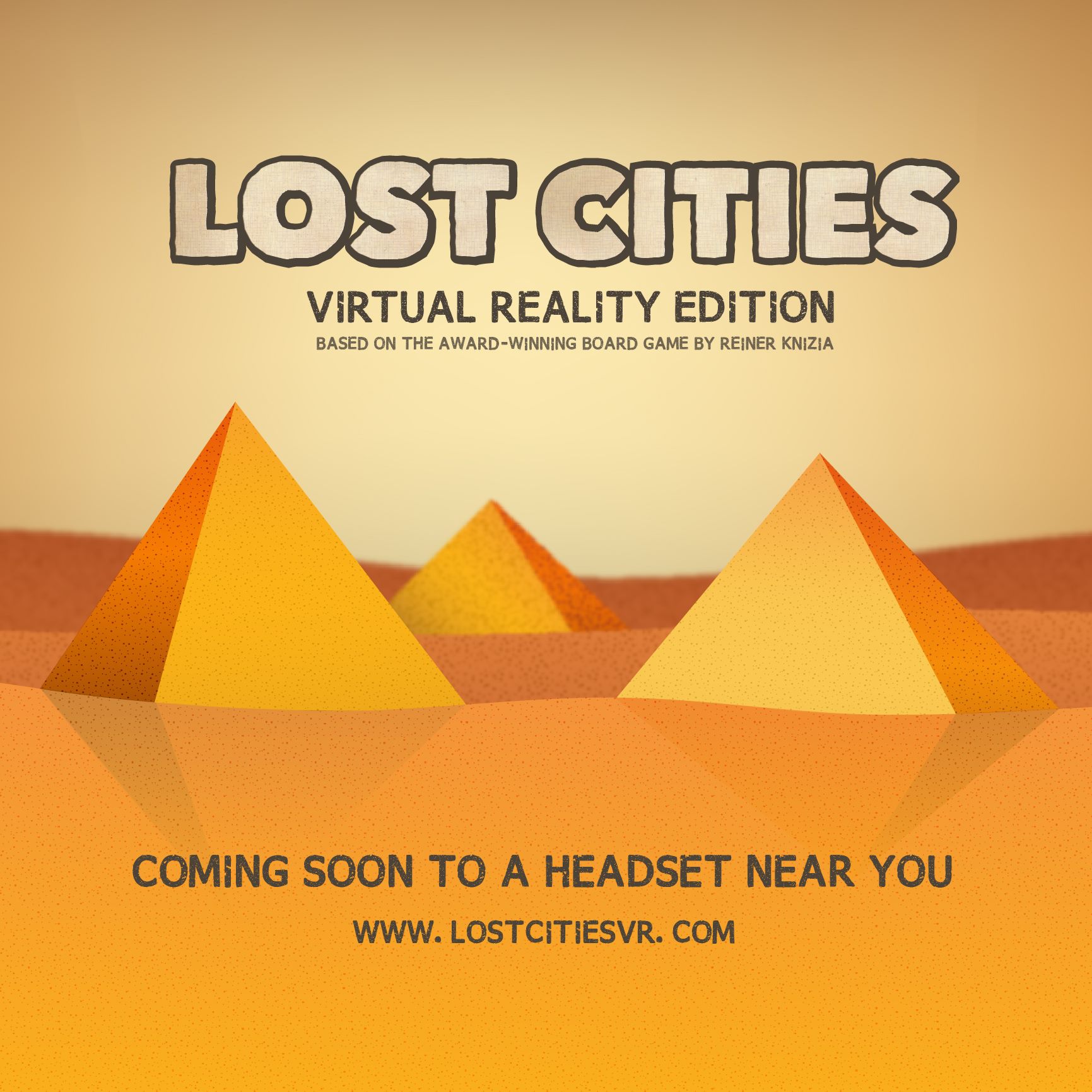
Speaking of John, his company The Campfire Union is developing a virtual reality version of the tabletop game Lost Cities for the Gear VR! We've played the game a few times at Across the Board and it's super fun, and I'm really looking forward to seeing how they make it shine in virtual reality!
Lately it seems like everyone in my life is up to so many cool things, it's so inspiring!
Since my last personal-type post I've been making a concerted effort to try and be more positive day-to-day, and to not let the things that bother me overwhelm me too much. I've been a bit of a handful recently emotionally and it feels good to be getting a sense of balance back in my life again (the nicer weather probably helps - it's easier to feel good when it's nice outside).
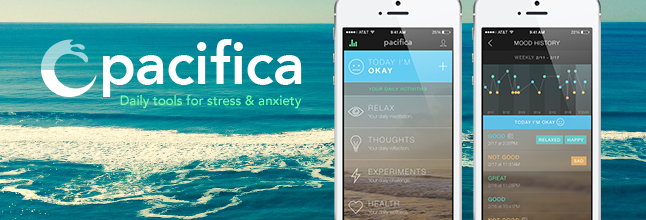
I've also been relying really heavily on my Pacifica app recently. I realized that in the month or so when my emotions were overwhelming me I wasn't using the app as often as I had been previously, and I realized that the mindfulness that 'checking in' to the app a few times a day gave me really helped me reflect and seek balance day-to-day.
Managing my anxiety is hard, but it's a learning process, and I'll only get better with time and practice.
In other news...
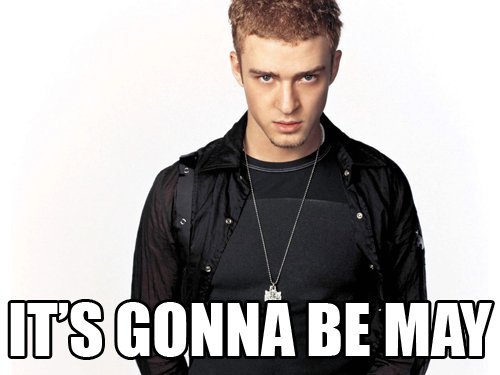
Happy Wednesday!
Crowdfunding Crash Course: 4 Lessons Learned So Far
- by Alyson Shane

Last week's interview with Khan Vikshyn marked the 5th installment of the Crowdfunding Crash Course series, and with that in mind I thought it would be helpful to start posting some summary-style posts which outline and feature some of the recurring themes and insight we've heard so far:
Promote Ahead of Time
Everyone interviewed mentioned using social media as part of their promotional arsenal, but few people mentioned using it prior to the campaign to drum up interest and build excitement around the campaign.
Meghan Athavale of Po-Mo Inc mentioned in her interview that one of the reasons why their initial Kickstarter campaign didn't reach its goals was because they didn't promote it properly ahead of time, and instead relied on the campaign itself as their promotional tool. In her interview she explained that she had learned from this experience and had spent a significant amount of time promoting her next Kickstarter in a variety of ways (paid Facebook ads, regular posts, Tweets, social shares, interviews, etc) to generate interest before the campaign launched.
The Takeaway: Use every tool at your disposal to promote your campaign before it starts. This can include Facebook posts, Tweets, LinkedIn messages, and frequent mentions in your newsletter, if you have one. Plus good old-fashioned word-of-mouth!
Have a Plan
One of the things that stood out for me throughout all the interviews was the level of preparedness required to run a successful crowdfunding campaign. Devin Reimer of OWLchemy Labs referred to the campaign as "one of the hardest and most stressful things I have ever done" and Khan Vikshyn mentioned that in order to prepare himself for his campaign he spent six months researching, reading, watching videos, etc. to gain a better understanding of what he was setting himself up to do.
The Takeaway: Do as much research as possible and prepare a detailed plan. Hire someone to help you if necessary (and you can afford it). A great example is how Khan Vikshyn's 45-day plan helped him stay organized and kept his project from overwhelming him.
I managed my campaign by creating a 45 day plan so I’d stay on track and would know what I should be doing each day and how far along I expected to be. I knew that once I kicked things off I’d be too busy doing things to research and plan so I had to be as prepared as possible.
- Khan Vikshyn
Factor in Hidden Costs
One of the things that stood out for me in Adam Brooks of Astron-6's interview was when he mentioned that he wished that he had budgeted for all the postage that he spent on the rewards, and Kelly Tindall also mentioned researching things like shipping outside of Canada, weight of shipped items, etc.
Adam mentioned needing "a cool project and cool rewards" in order to get people motivated to participate, which is definitely something to remember - people want to feel like they're getting something interesting or unique for their contribution in addition to the finished product, itself. However, not being prepared to deliver these rewards could negatively impact your campaign and cost you a lot more than you realize, if you aren't budgeting and planning for it.
The Takeaway: Think long and hard about the types of backer rewards you're planning to offer, and factor in things like shipping costs ahead of time. If possible, try to avoid having to ship things to anyone (eg: offer a digital download over a DVD) and save yourself the worry of having to budget to ship multiple types of items at different times during your campaign.
Reach Out to Everyone You Can
One recurring theme throughout everyone's interviews was that they made a point to reach out to everyone that they knew for support, both in terms of campaign contributions and also for spreading the word.
In addition to reaching out to friends, family, and their existing audience via social media, they reached out to local news outlets, relevant organizations who could promote their campaign, and a variety of online communities who would be receptive to sharing and supporting the campaign.
I have very loyal family and friends who really stepped up to help out with money and were willing to talk to others about the campaign... I had over a year’s worth of loyal fans who couldn’t wait to read a print version of [Strangebeard], too.
- Kelly Tindall
The Takeaway: Your campaign's success depends on your ability to get as many people as possible to contribute, so don't be afraid to ask friends and family for support, and make as many relevant news outlets and online communities aware of your campaign ahead of time. That way you can build on the momentum to keep interest (and donations!) going until you've hit your goal, or beyond!
Keep a very open mind, spend as much time as possible building an email list, and don’t be afraid to ask for help. You are about to ask hundreds of strangers for their money.This post is part of the #CrowdfundingCrashCourse series. You can find the entire series of interviews and summary posts here.
- Meghan Athavale
Crowdfunding Crash Course: Steve Meier aka Khan Vikshyn - Normal People
- by Alyson Shane
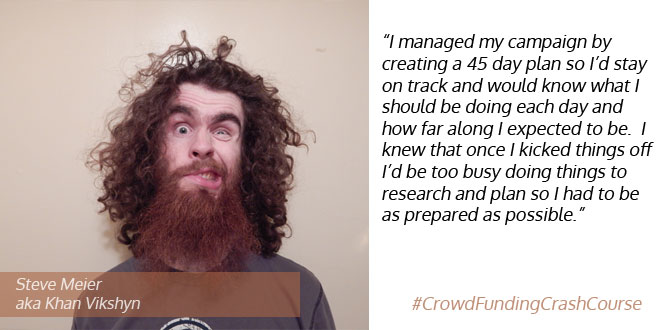
Steve Meier, aka Khan Vikshyn, is a Winnipeg-based poet and hip hop musician. He used Indiegogo to fund his debut album, Normal People.
Can you briefly talk about your album?
My album is called Normal People. I describe it as being inspired by everyday situations I face as a young man trying to find my way in life while working a dead end job and moonlighting as a rapper hoping to someday “make it” in the music industry. It’s available at khanvikshyn.bandcamp.com and in Winnipeg at Into the Music, Music Trader and HMV in Portage Place.
Why did you feel that the crowdfunding model was the best way to promote your album?
I felt that crowdfunding was the best way for me to promote my album because it allowed me to build excitement and a buzz around my project that I wouldn’t have been able to build otherwise. The people who donated to my campaign are still engaged and excited to see what I do next with my album.
Why and how did you choose Indiegogo over other crowdfunding options available?
I chose Indiegogo because it looked like one of the most legitimate and widely known platforms I could find and it didn’t seem to have many barriers in the way of getting started. It seemed more geared towards what I was planning to do and had a lot of projects by independent artists with smaller budgets and networks. It also offered the flexible funding option, meaning I would get whatever funds I raised regardless if I reached my fundraising goal or not.
How big was your budget before you launched your crowdfunding campaign?
I didn’t really have much of a budget before launching my campaign. Crowdfunding forced me to really look at what I was doing and set a budget and a direction. If I didn’t raise money this way I would probably still be in the position I was before I launched my campaign – an artist with a dream but no clear path – and it’d be years before I’d get a project out.
How far along was your project before you felt ready to launch a crowdfunding campaign? In hindsight, would you have preferred to be farther along, or to have crowdfunded earlier?
I had two songs recorded and mixed before launching my campaign. I think I was at the right point in creating my album when I decided to launch my campaign and ask for people’s help with the rest of it.
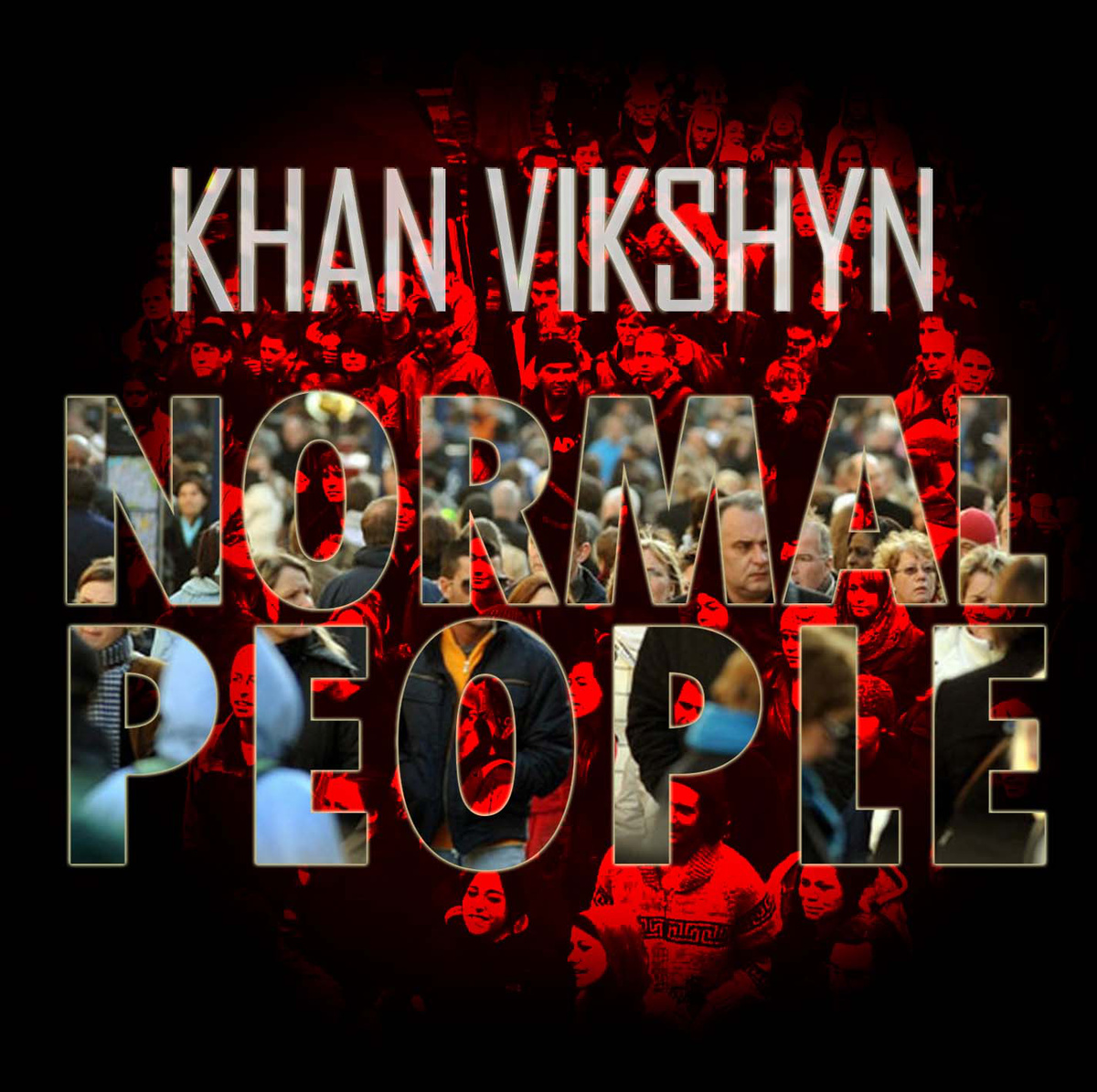
Can you explain how you prepared for and managed your campaign?
I prepared for my campaign by spending about 6 months absorbing as much information as I could on successful crowdfunding campaigns by reading articles and watching videos on other people’s experiences. I managed my campaign by creating a 45 day plan so I’d stay on track and would know what I should be doing each day and how far along I expected to be. I knew that once I kicked things off I’d be too busy doing things to research and plan so I had to be as prepared as possible.
What tools did you use to market your campaign? Do you feel like you did so successfully, and if not, what could you have done differently?
I marketed my campaign online and offline. I contacted people by phone and email and through Facebook and Twitter to ask if they’d consider donating towards my campaign. I also posted up flyers around Winnipeg and held a series of busking concerts with friends/artists of mine that I filmed and uploaded to YouTube and shared on Facebook.
In retrospect what were your best assets for running this successful campaign? On the other hand, what would you do differently?
I think my best assets for running my successful campaign were being open and transparent about what I planned to do with the funds I raised so people felt more comfortable about giving me money toward my project. If I could do something differently I would have spent more time researching ways to get picked up by media and blogs because I didn’t have much media coverage. I sent a press release to the [Winnipeg] Metro, CBC Radio and Winnipeg Alternative Media, and WAM posted it on their Facebook page.
What was your biggest challenge during your campaign?
The biggest challenge I faced during my campaign was overcoming negativity I sensed from those who didn’t understand what I was doing and didn’t take it seriously. Some people thought it was charity or that I was being lazy but I came to realise that not everyone is going to “get it” but you just need to do it anyway. It allowed me to really focus on the people showing me support and positivity because they’re the fans and the ones that matter.
What’s the most valuable advice you could share with aspiring crowdfunders?
The most valuable advice that I could share with aspiring crowdfunders is to not get discouraged and give up. Also, be prepared. Put in the necessary time to research how to run a successful campaign and have a plan in place for what you’re going to do before you kick things off. Once you launch you should be confident that you know what you’re going to do to accomplish your goal.
This post is part of the #CrowdfundingCrashCourse series. You can find the entire series of interviews and summary posts here.
Why I Haven't Been Around
- by Alyson Shane
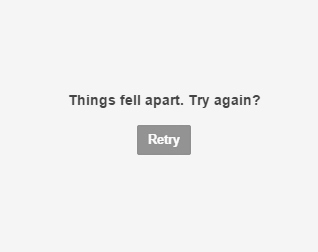
Things have been difficult lately.
Not life; life overall has been incredible. In the past few months I've had amazing opportunities fall into my lap, made new connections and friends, and started to take some serious action in terms of my own personal growth.
My mind has been difficult lately, though, which is why you haven't seen much of the "real" (non-professional) me on this blog recently. It's easy to crutch on my Crowdfunding Crash Course project, or to whip an article about content marketing together because it's knowledge that I can easily make sense of and put into words.
Anxiety doesn't work that way. It makes you mute. It makes you hole up inside yourself and just dig deeper and deeper, and you don't even realize you're doing it until someone points it out.
The other day, after a full-blown anxiety attack John said to me "have you been doing any writing therapy lately? You used to write all the time - when was the last time you wrote about things?" and I realized that I haven't. Going back through my posts, the last time I wrote something "personal" was March 5th, when I wrote "To My Family, Who Read This Blog."
It occurred to me, then, that that's what has been eating at me: since my family cut me out I've been allowing my anxiety to build inside of me because it's always in the back of my mind. It's hard to land speaking opportunities, new clients, meet new people and not be able to call my dad and say
"Hey Dad, guess what just happened!"
It's even harder not to be able to call and say
"Hey Dad, how are you? I love you, and I really miss you, and I wish that you were able to have the kind of relationship with me that I'd like us to have."
It eats at me some days.
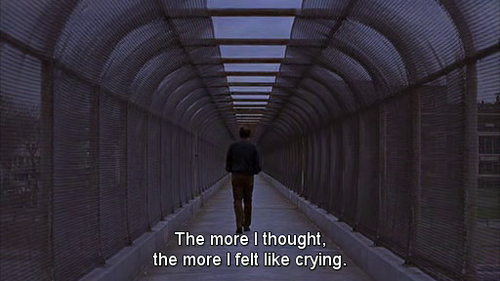
I think about my brothers a lot. I think about how they're younger than I am, and how they grew up with this idea that I'm this weird black sheep who just can't conform to what my parent's expectations are. I worry that they think that I'm a bad person because I'm not around to show them otherwise, because I know that that's the narrative that they're hearing: that I'm selfish. That I'm blaming everyone except myself. That I should just "suck it up."
I think about my mom a lot. My mom who refused to speak to me after I reached out to her; who stepped away from me and cast me out because I finally stood up for myself. My mom, who taught me so many negative behaviours and who has been the cause of so much of my stress, anxiety, and unhappiness. It's hard to disentangle myself from her influence, especially when she holds the keys to the cage in which the rest of my family resides, and manipulates everyone within it.
I think about my dad a lot, especially. I think about my dad every single day. I try to be objective and realize that, ultimately, the decision to not speak to me was, and continues to be, his own. But he's my dad. I'm his only daughter and I always assumed that, no matter what, he would be there for me. However he's also a person, one with flaws and issues just like everyone else, and it's unfair of me to put him up on a pedestal just because he's my father. Honestly though, that's been the hardest part so far.
The problem with thinking, and anxiety, is that it gets you caught up in these negative thought loops - your thoughts spiral downward and you get stuck running over the same comment or situation over and over. Everything suddenly becomes a really big deal.
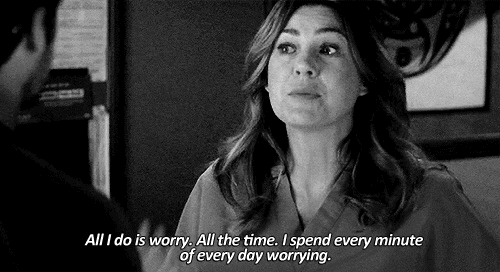
Which explains why every small issue that's come up in my life has also become a really big deal: because I have this huge issue looming over my life constantly which amplifies everything else. Every good thing is really, really good, and every bad thing is really, really, tremendously bad.
Which leads me to this post. These words, on this page, the over-sharing and stream of consciousness writing that, as I type these words on the screen helps lift that giant weight up off my chest. I need to remember that writing is therapy, and that I have a safe place, here on my blog, where I can write as much and as often as I need. That it's okay to be going through this and talking about it openly.
Thank you for being here, and for listening.
3 Tips to Run Multiple Social Media Profiles Without Losing Your Mind
- by Alyson Shane
Yesterday I was in a meeting where I was discussing how I manage multiple social media profiles, and the question that kept coming up was "how do you manage your time? Isn't it super time-consuming to manage all that information for multiple profiles at once?"
Honestly? It doesn't have to be!
Which leads me to this post. I want to share a few tips and tricks I've picked up to help make running multiple social media profiles a total breeze:
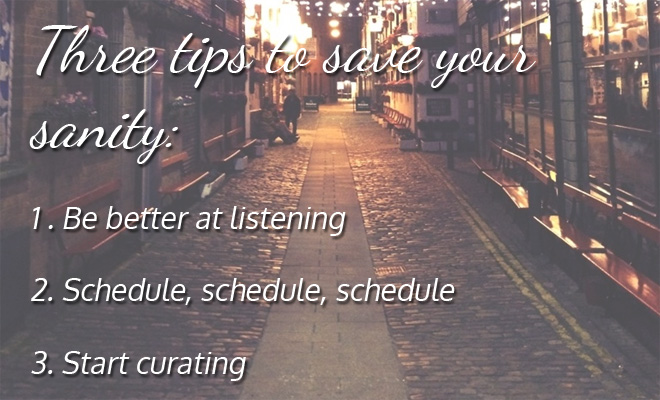
1. Maximize Your Listening
More and more people are taking to online spaces to share their thoughts online, and it's expected that brands and businesses are listening.
The vast majority of people expect a response to a Tweet in under 60 minutes, and as more brands take notice and start replying in a timely manner, that puts pressure on people like me to make sure that we're on the ball, as well.
What you can do:
Check your direct mentions on all social channels. You can set up email notifications or push notifications if you'd like, but these can be unreliable (Facebook, I find, is especially bad at 'forgetting' to do this) so the best way to manage this is to be logged in to each platform individually and manually check to see if someone has mentioned you or asked a question.
My favourite tool to manage this is Hootsuite, because it allows you to have multiple 'streams' of information open for every social profile that you manage.
2. Schedule Your Posts
This is so important. I wouldn't be able to do any of what I do if I wasn't able to schedule posts ahead of time.
Developing a content creation strategy is something that I'll discuss in a future post, but for now let's just stick with the basics: making sure that your content is scheduled to go out ahead of time will give you time to do things like respond to questions, direct messages, etc.
What you can do:
Again, my personal recommendation for this step is Hootsuite. I really love their desktop layout, and I have a column of scheduled tweets and posts that I can review at any time right in front of me along with the rest of my information.
However, don't go with Hootsuite just because I told you to! Some other really popular options are Buffer, Edgar and BundlePost. Do some research and figure out which works for you!
Protip: Scheduling content ahead at the beginning of the month is such an utter life-saver! I can't stress this enough: spend a few hours at the end of the month putting together your posts for the upcoming weeks and you'll save yourself a huge headache.
3. Curate Your Content
In addition to just sharing your own events and content and responding to messages, it's important to consistently share relevant content. Not only do you want to be an active presence online, but you want to be a "thought leader" as well.
This shows that you're at the forefront of the latest goings-on in your respective clients' industries - but how can you search for curated content in addition to keeping up with the needs of multiple profiles?
What you can do:
On Twitter, you can create a list of influential people in your industry, or people you want to connect with. Using these lists will ensure that you only see tweets from these sources, and can skim through them to see what they're sharing, and if it's relevant to re-share across your own networks.
Another great way to find content is by using a site like PopURLS, which shows the most popular content from several major online outlets, which you can narrow down by topics or sites of interest.
Hootsuite and Buffer also have 'content discovery' elements which will search through what's being highly-shared in your communities, which will give you some insight into what people are talking about and interested in at that particular moment.
Protip: Always read what you're sharing before sending it out! Never blindly share a link to a post without reading 100% of it.
Do you have any tips or tricks for managing multiple social media profiles? I'd love to hear them!
Crowdfunding Crash Course: Devin Reimer of OWLchemy Labs - Dyscourse
- by Alyson Shane
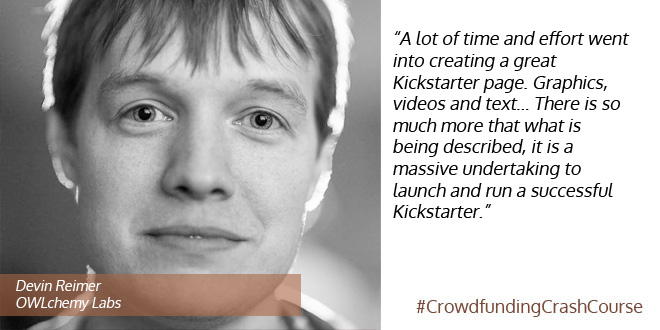
Devin Reimer is the CTO (Chief Technology Owl) at OWLchemy Labs, who are a group of "scientists on a search to find the formula behind the perfect enjoyable, silly gaming experience." Devin and the OWLchemy crew used Kickstarter to fund their game Dyscourse.
Can you briefly describe Dyscourse?
Dyscourse is an interactive choose-your-own adventure where you journey through a stylized world of choice and consequence. You play as Rita, an unfortunate art school grad turned barista, who is now stuck on a desert island with a crew of oddball travelers after a plane crash. That last choice you just made? It may end up being integral to your group’s survival, or it may lead you down a path to murder and cannibalism!
Why did you feel that the crowdfunding model was the best way to promote the game?
We hadn't yet done crowdfunding so it was something we wanted to try. We were about 7 months into development of Dyscourse, which would be the biggest title we had ever built. So crowdfunding allow us to let people see what we were working on much sooner so we could get feedback. Also this would start the word of mouth about what Dyscourse is and hopefully get people excited about it.
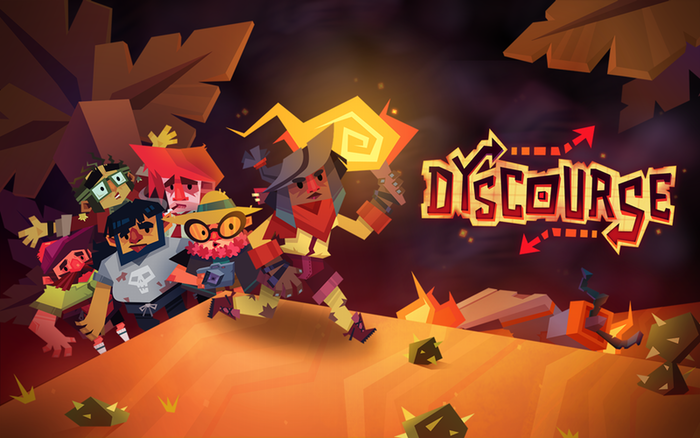
Why and how did you choose Kickstarter over other crowdfunding options available?
Kickstarter was the biggest and most well known.
How big was your budget before you launched your crowdfunding campaign?
We had already been working on the game for 7 months before the Kickstarter. The whole project took about 2 years to complete with a team that scaled from 4-10 people. The funds raised via the Kickstarter were just a part of the funding of Dyscourse.
How far along was your project before you felt ready to launch a crowdfunding campaign? In hindsight, would you have preferred to be farther along, or to have crowdfunded earlier?
We were 7 months into development prior to the Kickstarter. With this project, this was just enough time to figure out roughly what we wanted to build and be able to present that. Once you have crowdfunded something it becomes hard to drastically pivot your plan as that is not what people backed. Pivoting is a big part of game development. We ended up changing quite a bit from the original Kickstarter pitch, but the changes were not incredibly drastic and our backers were very supportive.
Can you explain how you prepared for and managed your campaign?
A lot of time and effort went into creating a great Kickstarter page. Graphics, videos and text. We had to figure out how to do physical rewards fulfilment (so we didn't undercharge). We also had a person to specially help with running the Kickstarter itself. Then there was all the work talking to the press and getting people excited for the Kickstarter. There is so much more that what is being described, it is a massive undertaking to launch and run a successful Kickstarter.
What tools did you use to market your campaign? Do you feel like you did so successfully, and if not, what could you have done differently?
Social media was a big part of getting the word out for our campaign. We were successful enough to get funded, which is the goal of crowdfunding at the end of the day. For marketing our Kickstarter I don’t know if there was anything I would have wanted to do differently.
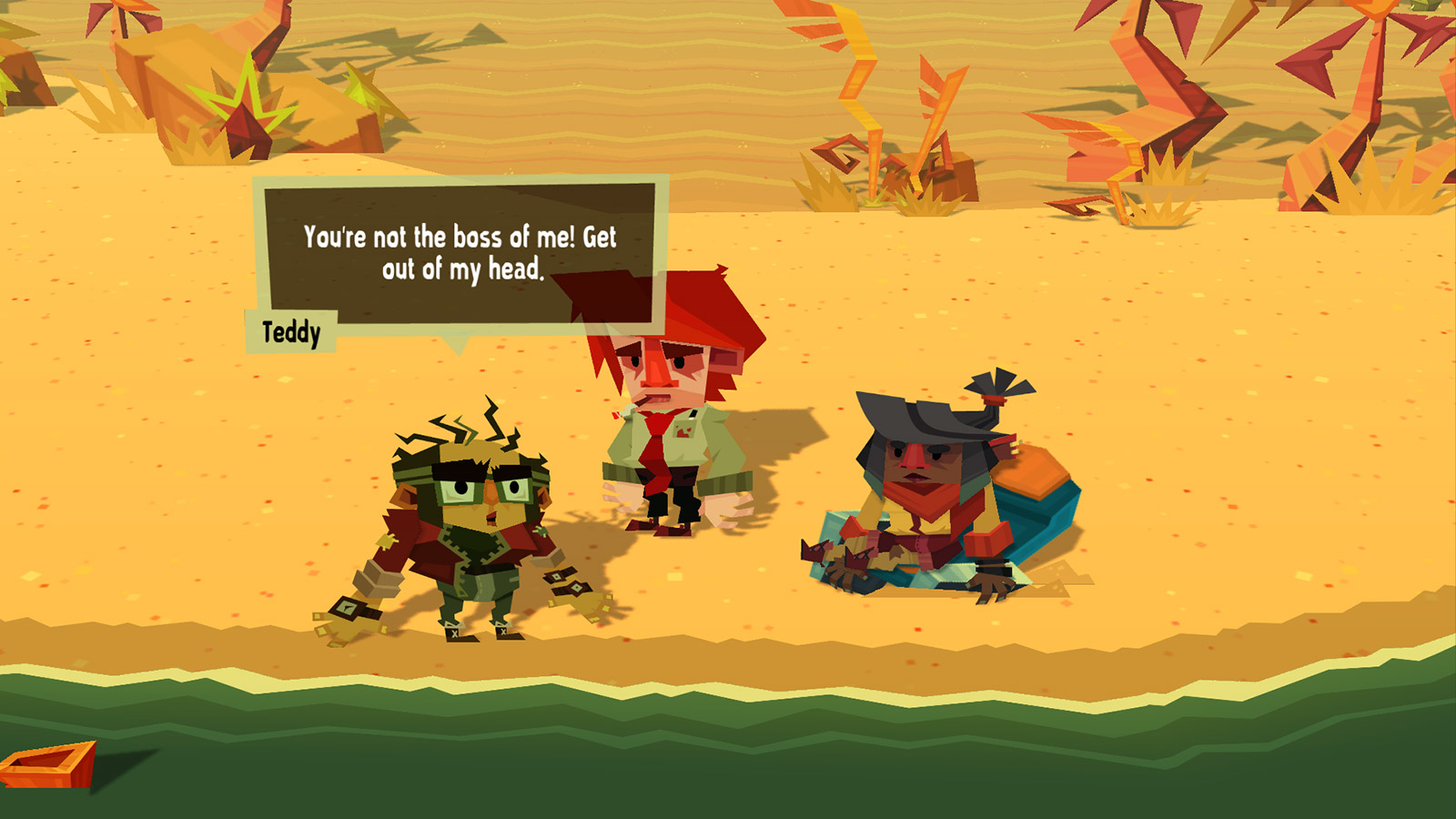
In retrospect what were your best assets for running this successful campaign? On the other hand, what would you do differently ?
There are a lot of fans of Owlchemy Labs so that helped a lot when running a Kickstarter. I can’t think of anything specific that should have been done differently. I only wish we would have known how much work it was going to be.
What was your biggest challenge during your campaign?
There are generally 3 kinds of Kickstarters. Ones that are rockets and are funded in less than 48 hrs, ones that no one is really interested in that fail almost immediately, and lastly there are the ones that go down to the wire. That was our Kickstarter. We got great support but it was both a marathon and a sprint. We got successfully funded but with not a lot of time to spare. This meant that for 30 days the whole team was working hard to make sure it would be successful. Which was not only very stressful but very time consuming. We also launched our Kickstarter on Nov 6, 2013, so this was leading right into the holiday season where generally people spent less money on crowdfunding. Also, this was at the same time as the PS4 and Xbox One console launches. That sucked a lot of money out of the Kickstarter ecosystem so it made getting funding that much more challenging.
What’s the most valuable advice you could share with aspiring crowdfunders?
It was super time consuming and stressful to run a Kickstarter campaign. It is one of the hardest and most stressful things I have ever done. If you are planning on crowdfunding talk to as many people that have been through the process as possible, before you decide if crowdfunding is right for you.
Dyscourse is now available on Steam (Win/Mac/Linux).
This post is part of the #CrowdfundingCrashCourse series. You can find the entire series of interviews and summary posts here.
Happy International ASMR Day
- by Alyson Shane
Ever since I was a little girl, I've always loved the sounds of people speaking softly, soft tapping, scratching or brushing sounds, and lightly-accented voices. I used to sit and watch Bob Ross for hours on end, mesmerized by his voice, and nobody around me could understand why.
This is because I have ASMR, or Autonomous Sensory Meridian Response, which Wikipedia describes as "perceptual phenomenon characterized as a distinct, pleasurable tingling sensation in the head, scalp, back, or peripheral regions of the body in response to visual, auditory, tactile, olfactory, or cognitive stimuli."
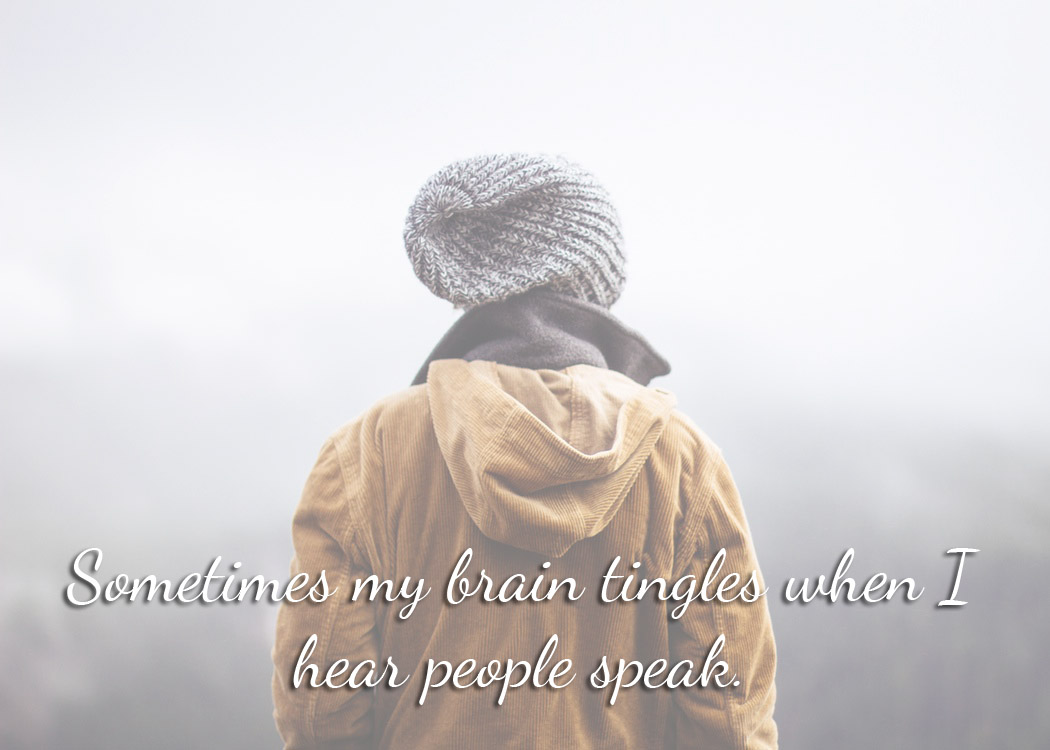
Basically what happens, for me anyway, is when I listen to people speaking softly, or hear "trigger" sounds, I get a pleasant tingling sensation in my brain. It also makes my skin really sensitive, and I frequently run my fingers gently along my arms or wrists when I hear someone that triggers it.
If you're unsure if you've ever experienced it, ask yourself if you've ever experienced a pleasant tingling feeling, wave of calmness, or "itchy brain" feeling when exposed to any of these triggers:
- Exposure to slow, accented, or unique speech patterns
- Viewing educational or instructive videos or lectures
- Experiencing a high empathetic or sympathetic reaction to an event
- Enjoying a piece of art or music
- Watching another person complete a task, often in a diligent, attentive manner. Examples: filling out a form, writing a check, going through a purse or bag, inspecting an item closely, etc.
- Close, personal attention from another person
- Haircuts, or other touch from another on head or back
I only realized that I had ASMR a few years ago - until then whenever I mentioned the "brain tingles" I would get, people looked at me like I had lost my marbles. It wasn't until listening to an episode of This American Life that I realized that there weren't just others like me, but a while community of people on YouTube, Reddit and elsewhere who share experiences and post videos or audio clips to try and trigger other people.
But why am I talking about this?
First, it's because today is International ASMR Day, so it feels appropriate.
Second, I wanted to write about how finding acceptance in the ASMR community has helped me start accepting a part of my life that I had largely kept hidden from people. Being able to understand and find acceptance about something that had always alienated me from other people was a huge weight off my shoulders. You can only hear "you're weird" or "you're crazy" so many times before you stop trying to discuss an experience with people.
One of the amazing things about the ASMR community online is how kind and accepting everyone is. We all share a weird connection, and most ASMR artists incorporate kind, relaxing, and supportive messages into their videos as part of the "relaxing" experience that ASMR causes.
Third, I wanted to discuss it because ASMR videos have played a huge role in dealing with my anxiety. In addition to feeling a connection with the ASMR artists, the videos have a hugely calming effect on me, and have been a really powerful tool in helping me calm down during an anxiety attack, or helping me focus when I'm stressed out. There's even an article on LifeHack.org about using ASMR to de-stress.
Below are a few of my favourite ASMR videos, which I play on a regular basis when I'm stressed out or just want to experience a pleasant, calm feeling.
If you experience ASMR, or maybe even if you don't (who knows?) they might help calm you or make you feel good:
Do you have ASMR? If so, do you use it to help with an issue like stress or anxiety?
Crowdfunding Crash Course: Kelly Tindall - Strangebeard
- by Alyson Shane
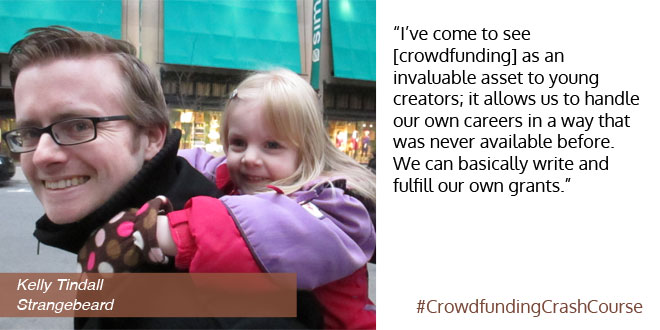
Kelly Tindall is an illustrator, cartoonist and a teacher. He writes the webcomic Strangebeard and used a Kickstarter campaign to raise the funds to print and distribute a finished book version of the comic.
Can you briefly describe Strangebeard?
Strangebeard is the two-fisted story of Jenny Brigham, servant girl, who is possessed by the ghost of the long-dead Pirate Emperor Augustus Strangebeard. Soon she finds herself with all his magical powers… but also the loyalty of his duplicitous pirate crew!
Why did you feel that the crowdfunding model was the best way to promote the comic?
It was the best option for me. I spent a year pitching it to comic-book publishers; almost all of them liked the book but nobody was willing to take a chance on an all-ages book starring a little girl. So, it fell to me to raise the money myself.
Why and how did you choose Kickstarter over other crowdfunding options available?
I was not an early adopter of Kickstarter; it felt desperate to me, initially. But I’ve come to see it as an invaluable asset to young creators; it allows us to handle our own careers in a way that was never available before. We can basically write and fulfill our own grants.
I chose Kickstarter because it’s got more credibility, and the rule about only receiving the funding if you make your budget makes it more like a game show; people love to back a winner.
How big was your budget before you launched your crowdfunding campaign?
$4500 CAD. I’m glad we went well over that, as the U.S. dollar started to strengthen and the final printing tally was a little over $5000. We ended up at about $8300 CAD at the end; every dime went to the project, and then some.
How far along was your project before you felt ready to launch a crowdfunding campaign? In hindsight, would you have preferred to be farther along, or to have crowdfunded earlier?
Nope, I picked a nearly perfect time. The book was nearly complete and all I had to do was compile existing work and secure the art for the pinup section. It might have been nice to be completely done but there’s always more you can do. At some point you just have to pull the trigger.
Can you explain how you prepared for and managed your campaign?
Tons of research. I had to figure out the printing costs, costs of extras for stretch goals, weight of shipped items, the costs for shipping materials, the costs to ship both to Canada and outside, how to put together a good video, and I had to create all the buttons and art for the Kickstarter itself. Probably a solid month’s part-time work.
What tools did you use to market your campaign? Do you feel like you did so successfully, and if not, what could you have done differently?
I think I did pretty well… I updated Twitter three times a day and Facebook every couple of days, and I appeared on at least six podcasts, a number of online interviews, one radio broadcast, and got featured in my hometown newspaper.
In retrospect what were your best assets for running this successful campaign? On the other hand, what would you do differently ?
I have very loyal family and friends who really stepped up to help out with money and were willing to talk to others about the campaign. To say nothing, of course, of the brilliant artists who supplied pinups for the book. I had over a year’s worth of loyal fans who couldn’t wait to read a print version of the story, too.
What was your biggest challenge during your campaign?
Ultimately, I think shipping and budgeting were the two that were the most difficult to deal with. I had a few odd-shaped items that needed to go (original art from the comic series) and they were a struggle to get out the door. Not having tiered options for shipping meant that overseas customers had to be charged above and beyond via messages, because their packages were so much more expensive and Kickstarter didn’t have shipping options for multiple countries.
What’s the most valuable advice you could share with aspiring crowdfunders?
Do your research. Talk to friends who have done Kickstarters and pick their brains. Don’t be afraid to market yourself, but don’t hassle people (especially strangers). Work hard, and get as much done as you can before the campaign ends. And have fun! People can tell when you’re enjoying yourself.
This post is part of the #CrowdfundingCrashCourse series. You can find the entire series of interviews and summary posts here.
5 Steps to a Better Social Media Profile
- by Alyson Shane
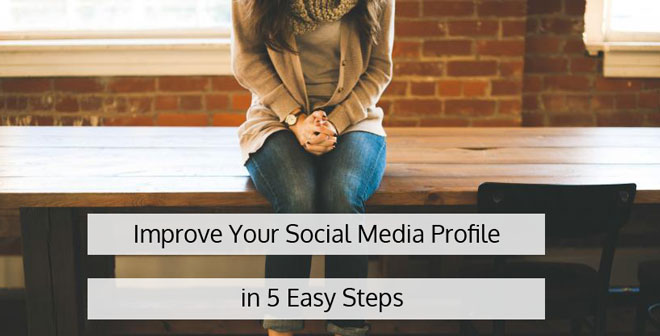
Whether it's on Facebook, Twitter, Pinterest or LinkedIn, it's pretty much guaranteed that your profile on one of these websites will be one of the first things that someone Googling your name is going to come across.
As such, making sure that these profiles are up-to-date is key to attracting new business, gaining followers and (let's be honest) making an impact online.
Luckily it's pretty easy to make sure your profile is up to snuff!
Let's Get Started
1. Never Leave a Profile Empty
People need to know more about you than just your name. Pop in a short bio, a few links to work you've done, or a quote you love. Anything is better than leaving it blank!
2. Use Keywords
For best SEO results, include some keywords into your bio. For example, if you're a mommy blogger who wants to work with family-oriented brands, then state "mommy blogger" in your profile. Here's mine on Twitter:
Marketing Manager by day. Blogs at http://www.alysonshane.com and does freelance copywriting & content marketing by night. Is the Queen of the Internet.
and on Linkedin:
Alyson Shane: Content Marketing & Social Media, Blogging, Speaking
3. Reference your work
Do you run a blog? Are you a regular contributor to a website? Are you a brand ambassador? Make sure to mention it in your bio for maximum credibility!
4. Show some sass
If the space allows, try not to just be matter-of-fact. Add a quote or interesting fact about you at the end of your profile. For instance, my Twitter profile states that I'm the Queen of the Internet.
5. Include a photo
Include a photo of your lovely face! People want to know that they're connecting with a real person, not just an egg on Twitter or a blank face on Facebook. Profiles that don't have real photos scream "spam account" and you don't want to be mistaken for one of those, do you?
What about you?
Did you have any profiles that were blank? What changes did you make?

